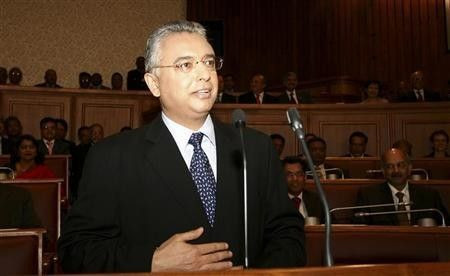S.Africa's Gordhan aims for primary balance by 2015

South Africa will see its budget deficit widen a touch this year to support a weak recovery, but aims to constrain expenditure and keep debt in check and over the following three years.
In its medium-term budget policy statement, the National Treasury said the deficit would be financed mainly through domestic auctions, with no plans to increase global borrowing from the $1 billion a year for the next three announced in February.
Finance Minister Pravin Gordhan said he would like to see a positive primary balance by 2015.
Growth in Africa's largest economy has slowed, putting revenue under pressure, a scenario that will continue over the next three years.
The Treasury cut its growth forecast for the next three years, seeing GDP growth rising to 4.1 percent in 2013, compared with 4.4 it forecast in February.
Current growth rates are not fast enough to support the employment gains and poverty reduction that the country requires, it said in its medium-term budget policy statement.
The rand weakened to 7.9150 against the dollar from 7.8630 before Gordhan's comments about not using reserves, while bonds firmed after the assurances about no new debt issuance.
The yield on the 2015 bond fell to 6.67 percent from 6.71 percent before the speech started.
The government has previously said the economy needs to grow by an average 7 percent a year to make a meaningful dent on unemployment currently at over 25 percent of the labour force.
With 15.2 million people receiving some kind of government assistance, social protection is the second biggest expenditure category after education.
President Jacob Zuma's government has to reduce poverty to take the pressure off state coffers and ensure social stability.
Gordhan plans to direct more funds towards investment and moderate spending in other categories. He is worried about the government's wage bill, the fastest-growing component of expenditure over the past decade.
Wage settlements need to be balanced against social and economic priorities. Moderation in the growth of the wage bill will see compensation as a proportion of non-interest spending decline of the (medium term) the Treasury said.
To avert a strike, the government settled with workers on a 6.8 percent wage rise, far above the rate of inflation which was at 5.7 percent year-on-year in September.
It said for it had budgeted state wage settlement of five percent.
FUNDING
After two years of surpluses prior to 2009's recession, South Africa's budget swung back into deficit.
Gordhan said he wanted to moderate spending growth and increase revenue intake over the next three years, stabilising debt.
This means by 2014/15, we can begin to rebuild fiscal space, with a positive primary balance, or revenue broadly in line with non-interest spending, Gordhan said.
For this financial year, the Treasury will raise its borrowing requirement to 166.6 billion rand this year from 157.9 billion forecast in February, to plug the budget gap.
Gordhan has previously said it would take between three and four years for revenue to recovery to pre-recession levels.
Should the economy fail to recover as predicted, ensuring long term fiscal sustainability would require a combination of slower spending growth and policy measures to raise tax revenue, the Treasury said, not clarifying whether personal income tax could rise.
Net loan debt as a percentage of GDP is seen at 33.8 in the current financial and is seen rising to 39.7 percent by 2015.
© Copyright Thomson Reuters 2024. All rights reserved.





















